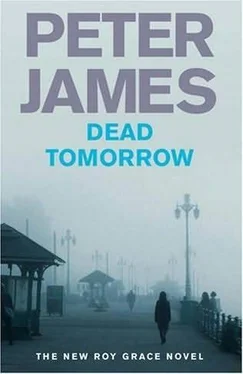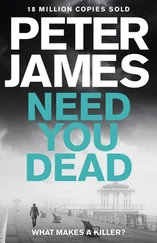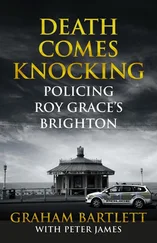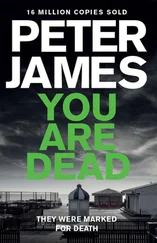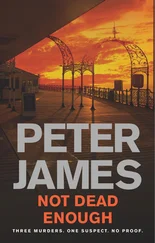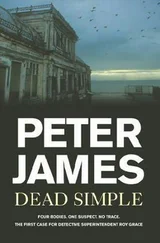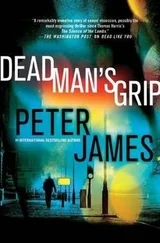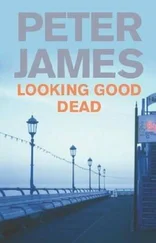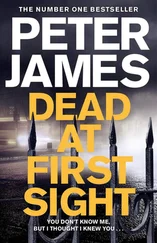‘Rares?’ Norman Potting said. ‘Could be a bad spelling of rash ! Which might mean it’s a nasty rash!’ He chuckled at his own joke.
‘My guess is it’s a name,’ Roy Grace said, ignoring him. ‘The most likely thing a teenage girl would have tattooed on her arm is the name of a boyfriend. This one looks as if she might have done it herself. Anyone ever heard of this name?’
No one had.
‘Norman and E-J, I’m tasking you with finding out if this is a real name – and in which country. Or what it means if it isn’t a name.’
Then he looked at DI Mantle. ‘I know you’ve been out of the loop for a couple of days on your course, Lizzie. Anything you need to know at this stage?’
‘No, I’m up to speed, Roy,’ she said.
‘Good.’
Still on his feet, he glanced around the room and looked at the HOLMES analyst, Juliet Jones, a dark-haired woman in a brown-striped shirt.
‘Over the weekend we need a scoping operation – check with every county force in the UK to see if they have anything remotely similar. We can’t assume this is about transplants. It’s the most obvious line of enquiry, but we mustn’t rule out having a lone nutter on our hands. Nadiuska reckons that whoever did this has surgical skills. We need to find out from the Home Office about every surgeon, and doctor with surgical skills, who has been released from prison or from a mental home in the last couple of years as another starting point.’ He thought for a moment. ‘And all surgeons who have been struck off who might have a grievance.’ He noted this down as an action for the researchers.
‘What about the Internet, Roy?’ asked David Browne. ‘I recall that someone advertised a kidney for sale on eBay a few years ago. It would be worth a trawl.’
‘Yes, that’s a very good point.’ He turned to Lizzie Mantle. ‘Can you get the High-Tech Crime Unit on to that? See if anyone is advertising organs for sale.’
‘Do you really think anyone would do that, Roy?’ Bella asked. ‘Kill victims and sell their organs?’
Grace had long passed the period when he questioned human potential for evil. You could take the most horrific thing your brain was capable of imagining, then multiply it by a factor of ten and it still would not bring you close to the levels of depravity that people were capable of.
‘Yes,’ he said. ‘Unfortunately, I do.’
Half past three and it was already growing dark outside. Lynn stood at her kitchen table, staring out of the window, waiting for the microwave, which was making a sound like a chainsaw inside a metal dustbin, to finish its cycle. Rain was pelting down and the back garden, which she tended proudly for most of the year, now looked badly neglected.
The autumn roses needed dead-heading, and the grass, beneath a carpet of fallen leaves, needed cutting again now, even though it was the end of November – thank you, global warming, she thought. Maybe next weekend she would have the energy and enthusiasm. If…
A big if.
If she could get through the terrible fear for Caitlin that was gripping her, almost paralysing her mind, making it impossible to concentrate on anything, even the newspaper.
There was something about Sunday afternoons that she had never liked, for as far back as she could remember. A feeling of gloom that the weekend was ending and it was back to the real world the next day. But it wasn’t just gloom this afternoon. She felt sick with fear for Caitlin and helpless – and angry at her helplessness. Seeing her daughter’s frightened face these past days in the hospital and being unable to offer her anything but words of reassurance, a few teenage magazines and some CDs was eating away at her soul.
Helping people was one of the things she had always done best in life. For two years during her mid-teens she had helped her younger sister, Lorraine, crippled and bedridden after being knocked off her bike by a lorry, slowly get back to health and start walking again. Five years ago, she had again helped Lorraine through her divorce and then through the battle she had finally lost against breast cancer.
After her own divorce, her mother had been her rock, but she was growing old and, although still strong, at some point in the coming years Lynn knew that she would lose her too. If she lost Caitlin as well, she would be utterly alone in the world, and that selfish thought scared her almost as much as the pain of seeing Caitlin suffering now.
The last few days in the Royal South London had been a living hell. They had organized a room for her for the past three nights, in a Salvation Army training centre across the street from Caitlin’s ward, but she had barely spent any time in it, not wanting to miss out on any of the examinations and tests for transplant suitability that Caitlin had been put through, almost around the clock. She’d chosen instead to sleep in a chair next to her daughter’s bed.
She had lost count of the people her daughter had seen. All the different members of the transplant team, the social workers, the nurses, the registrar, the consultant hepatologist, the consultant surgeon, the anaesthetist. All the scans, the blood tests, the base line measurements, the imaging, lung function, cardiac assessments and seemingly endless and repetitive clinical reviews.
‘I’m just an exhibit, right?’ Caitlin had said, despairingly, at one point.
The one person to whom Caitlin responded, the consultant, Dr Abid Suddle, had assured them both, this morning, that hopefully a match would be found very quickly, despite Caitlin’s rare blood group. It was possible within just a few days, he said.
Lynn always felt reassured by him. She liked the man’s energy, his warmth and his genuine concern. She saw he was someone who worked incredibly long hours and she believed he truly would go the extra mile for Caitlin, but the fact remained that there was a world shortage of livers and Caitlin had a rare blood group. And there was another problem. As had already been explained to them, Caitlin had chronic liver disease. Priority was given to those with acute liver disease.
Dr Suddle had explained that there were other, not so rare blood groups that could be a match in liver transplants, so that needn’t be a cause for worry. Caitlin was going to be fine, he told her. And Lynn knew that Dr Abid Suddle did want her to be fine.
But she also knew he was part of a system. He was just one exhausted member of a very big, very overworked and permanently exhausted but caring team. And Luke, who had frightened her, had made her go to the Internet herself. It was hard to find an accurate figure for the number of people in the UK waiting for a liver transplant. Dr Suddle had admitted privately that 19 per cent at the Royal died before one became available. And she felt sure he was not telling her the whole truth. Priorities got shifted at every week’s Wednesday meeting. In all the down-time she had, she talked to patients who found themselves endlessly bumped down the list by others in worse condition than themselves.
It was a lottery.
She felt so damn helpless.
The thick wodge of the Observer newspaper and all its supplements lay on the table and she glanced at one of the front-page headlines, forecasting more economic gloom, falling property prices, rises in bankruptcies. And tomorrow, going back to work again, she would have to deal with the human fallout from all of that stuff.
She felt sorry for almost everyone she spoke to on the phone when she was at work. Decent, ordinary folk who had got themselves into a financial mess. There was one woman, Anne Florence, almost the same age as herself, and with a sick teenage daughter. Her problems had begun a few years back when she bought a car on hire purchase for £15,000, but failed to keep up the insurance payments and then the car was stolen. It left her still owing the hire purchase company, but without a car.
Читать дальше
